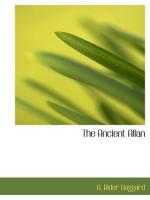Apparently we were expected, for a tall and proud-looking girl clad in white and with extraordinarily dark eyes, appeared in the doorway and asked in a soft voice if we were the noble Shabaka and Bes, his slave.
“I am Shabaka,” I answered, “and this is Bes, who is not my slave but a free citizen of Egypt.”
The girl contemplated the dwarf with her big eyes, then said,
“And other things, I think.”
“What things?” inquired Bes with interest, as he stared at this beautiful lady.
“A very brave and clever man and one perhaps who is more than he seems to be?”
“Who has been telling you about me?” exclaimed Bes anxiously.
“No one, O Bes, at least not that I can remember.”
“Not that you can remember! Then who and what are you who learn things you know not how?”
“I am named Karema and desert-bred, and my office is that of Cup to the holy Tanofir.”
“If hermits drink from such a cup I shall turn hermit,” said Bes, laughing. “But how can a woman be a man’s cup and what kind of a wine does he drink from her?”
“The wine of wisdom, O Bes,” she replied colouring a little, for like many Arabs of high blood she was very fair in hue.
“Wine of wisdom,” said Bes. “From such cups most drink the wine of folly, or sometimes of madness.”
“The holy Tanofir awaits you,” she interrupted, and turning, entered the doorway.
A little way down the passage was a niche in which stood three lamps ready lighted. One of these she took and gave the others to us. Then we followed her down a steep incline of many steps, till at length we found ourselves in a hot and enormous hall hewn from the living rock and filled with blackness.
“What is this place?” said Bes, who looked frightened, and although he spoke in a low whisper, our guide overheard him and turning, answered,
“This is the burial place of the Apis bulls. See, here lies the last, not yet closed in,” and holding up her lamp she revealed a mighty sarcophagus of black granite set in a niche of the mausoleum.
“So they make mummies of bulls as well as of men,” groaned Bes. “Oh! what a land. But when I have seen the holy Tanofir it was in a brick cell beneath the sky.”
“Doubtless that was at night, O Bes,” answered Karema, “for in such a house he sleeps, spending his days in the Apis tomb, because of all the evil that is worked beneath the sun.”
“Hump,” said Bes, “I should have thought that more was worked beneath the moon, but doubtless the holy Tanofir knows better, or being asleep does not mind.”
Now in front of each of the walled-up niches was a little chapel, and at the fourth of these whence a light came, the maiden stopped, saying,
“Enter. Here dwells the holy Tanofir. He tended this god during its life-days in his youth, and now that the god is dead he prays above its bones.”




